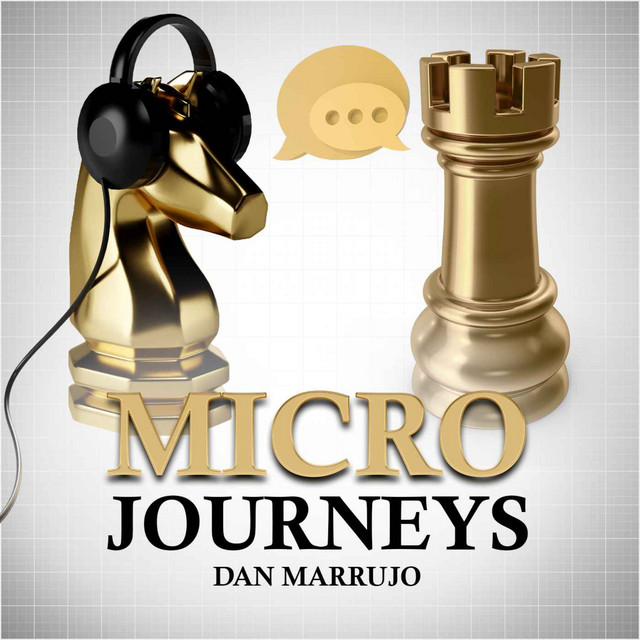MICRO JOURNEYS PODCAST

About Dan Marrujo
Daniel Marrujo is a former Chief Strategy Officer and former Director of the Office of Research and Technology Applications (ORTA) at the Defense Microelectronics Activity (DMEA).
Mr. Marrujo began his career at Raytheon Missile Systems in Tucson, AZ., developing missile guidance systems for their advanced programs. He then moved to DMEA, in his hometown of Sacramento, CA., working for the Trusted Integrated Circuit (IC) program office. In conjunction with working on the Trusted IC program, he began working towards the development of DMEA’s reliability capabilities and was selected to lead the National High Reliability Electronics Virtual Center (HiREV).
Mr. Marrujo also established the NRO’s VS&E program which has executed a number of solutions protecting National Security. As a subject matter expert, he has provided his technical expertise in multiple DARPA, IARPA and National Security Space programs. His focus areas are Microelectronics Obsolescence, State of the Art Microelectronics Acquisition, State of the Practice Microelectronics Sustainment, Advanced Packaging, Supply Chain Risk Management, Semiconductor Reliability, Semiconductor Reverse Engineering and Semiconductor Radiation Effects.
In 2016, Mr. Marrujo was selected as DMEA’s Chief Strategy Officer, directly supporting the DMEA directorate. In this position, Mr. Marrujo works with DMEA senior leadership to define and represent the integrated DMEA message and strategic path forward for future engagements.
Latest Episodes
In this special multi-guest edition of Micro Journeys, Daniel Marrujo brings together three powerful voices shaping the world from radically different angles: epidemiologist Dr. Dan Janies, semiconductor executive Thomas Sonderman, and retired A-10 pilot Dave “Trashman” Hicks. Across public health, national security, and combat aviation, each guest offers a compelling look at the hidden systems that shape modern life—and the micro decisions that change everything. From the real origins of pandemics, to America’s fight for chip independence, to life-or-death missions above the battlefield, this episode captures the grit, intelligence, and resilience behind today’s most consequential challenges.
As the conversations deepen, listeners learn how invisible vulnerabilities—whether in global health surveillance, foundational microelectronics, or military operations—can lead to catastrophic consequences when ignored. Each guest traces the root causes inside their domain: zoonotic spillover events no one was watching, domestic manufacturing gaps decades in the making, and combat environments where the smallest misstep can mean an irreversible loss of life. The stories are riveting, the stakes are high, and the lessons reveal how fragile—and how fixable—our systems can be.
The episode ultimately shows that preparedness, innovation, and adaptability are the keys to navigating an unpredictable world. Whether through scientific insight, industrial reinvention, or military precision, the solutions all point toward the same truth: real progress begins with taking action before the crisis arrives.
In this special “Best of 2025” episode, Daniel Marrujo revisits three of the most compelling conversations of the year with Tsu-Jae King Liu, Stacie Williams, and Jennifer Buss—women whose work sits at the center of America’s technological, strategic, and scientific future. These are the voices shaping semiconductor innovation, national security thinking, and the next era of space capability. Through moments of challenge, personal turning points, and candid reflection, this episode reveals just how deeply these leaders influence the decisions and technologies that will define the decades ahead.
Daniel takes listeners deeper into the difficult questions each guest confronts: the global competition for technological advantage, the shrinking pipeline of American R&D investment, and the internal battles that shape every career trajectory. From geopolitics and workforce shortages to daylight satellite imaging breakthroughs and the unexpected life choices that led each woman into her field, this episode highlights the problem facing the United States and how to maintain leadership when its greatest challenges require long-term thinking.
Ultimately, their stories point toward a solution that’s both simple and difficult: the United States must commit to cultivating talent, investing in science, and listening to the people doing the work. Working from this, Tsu-Jae King Liu, Stacie Williams, and Jennifer Buss show us what that future can look like.
Northrop Grumman Program Manager Brittany Battaglia joins host Daniel Marrujo for a deep dive into the evolution of microelectronics manufacturing, advanced packaging, and the future of on-shore capability in the United States. Brittany shares her winding career path—from business studies and global supply chain into highly technical program leadership—and how her cross-functional experience uniquely positions her to support the needs of today’s rapidly accelerating defense and commercial markets.
In this episode, Brittany details the transformation occurring inside the Northrop Grumman Microelectronics Center (NGMC), the rollout of its open access model, and why packaging and secure on-shore manufacturing have become essential to national security and technological competitiveness. She explains how Northrop’s “FedEx Flow” streamlines historically fragmented processes across fabrication, bumping, dicing, assembly, and testing—reducing complexity, cost, and delays for customers across the defense industrial base and emerging commercial partners.
Ultimately, this conversation reveals how Northrop Grumman is tackling the bottlenecks in microelectronics with speed, state-of-the-art facilities, and a uniquely integrated ecosystem. Brittany outlines how NGMC’s approach delivers faster timelines, repeatable manufacturing, secure handling, and a single point of accountability—offering a scalable solution to one of the nation’s most pressing technology challenges.
